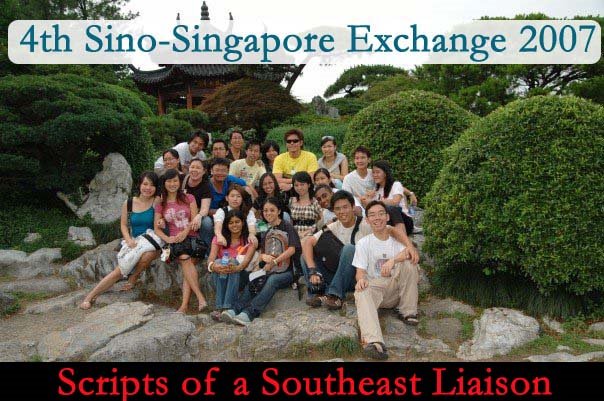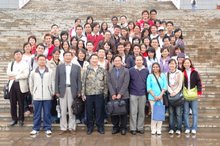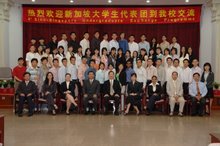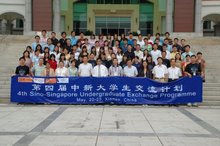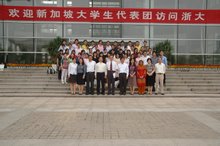Thursday, August 9, 2007
China – A Land of Many Faces
By Shree Ravi
The temperatures dipped but our spirits did not. Unlike many of my Singaporean friends who frequent China, the land was brand new to me. And judging by the stares I got from passers-by, I can safely assume I was also equally brand new, to the point of being alien-ish.
Overjoyed at seeing the familiar faces of our Chinese counterparts, we sought eagerly to reinforce the connection forged in March. Although we had landed in the middle of their examinations, what warmed us up in the cold of Kunming was the fact that our friends still played extremely gracious hosts. If there was a place we wanted to see, a dish we wanted to taste, an item we wanted to bargain for, people we needed to speak Mandarin to, or even a freak incident like a lost painting we needed to track down (all this should actually be stated in the first person singular but our group is BIG on solidarity J), they guided us with an alacrity that was extremely endearing.
What struck me as interesting about Yunnan was its fairly simple economic structure that depended on the natural beauty of the place. Rightly called the Spring City, it is not surprising to hear that it is Asia’s largest flower market when you pass along the gorgeous flower-decked pavements lining the city’s roads. Three days were simply not enough to soak in all the beauty and history of the place.
From the serene calm of Yunnan, we moved onto a faster pace of life in Guangzhou. Being a bigger and a “citier” city, we had the comfort of unleashing our concrete-jungle born selves in a spree of shopping, supper-ing and KTV-ing with our pals from Sun Yat Sen University. Apparently, the food in Guangzhou is to die for and since that is indeed the way to a Singaporean’s heart, the city became an instant favorite. Even my own vegetarian existence had its moments of bliss due to the Custard Baos that I devoured in every grand dim-sum supper outing. Apart from the food theme, we visited sights laden with historical memories, the most important being the Sun Yat Sen Presidential Palace. The auditorium is a prestigious place for artists all over the world to perform in and a tremendous crowd-puller.
Quite inconsequentially, it was here that we first spotted a very interesting trend among the tourists we saw: couples, mostly Americans, who had with them Chinese babies that they were in the process of adopting. Due to China’s single-child policy and preference for the male child, a lot of Chinese baby girls are discarded or given up for adoption, and there is a market for these kids among childless Western couples. The sight of these babies with unmistakably Asian features being cared for by utter foreigners, and to be raised so far away from their homeland and biological families, left me with bittersweet thoughts…
Guangzhou passed us by and Xiamen treated us to an experience that was totally different from the former two cities. Yet the one constant factor was the warm reception extended to us by our Chinese friends in every city. The Xiamen University students took organization to a whole new level by distributing mini booklets on our schedule (down to the tiniest detail) and while it was an exhaustive itinerary, we had a memorable time to say the least.
The university itself was a grand sight. The main campus lay sprawling with the mountains behind and the ocean in front with Taiwan just around the corner! As if this was not impressive enough, the other campus lies on an island just a ferry-ride away from the main one complete with a golf course to boot! Nevertheless, despite all this novelty, Xiamen itself gave us a feeling of comforting familiarity, much having to do with the fact that the city was modeled after Singapore ten years ago. Time passed swiftly in Xiamen, on the islands and on the mainland, and always in the company of our friends who pampered us to bits. The pastries they prepared for each one of us for our flight to Hangzhou bears testament to the generous hospitality with which they showered us.
The grand finale: Hangzhou. We visited our friends from Zhejiang University, also known as “Cambridge of the East”. It was indeed an honour for us to interact with students of such brilliant calibre. They too exhibited the heightened sense of hospitality and warmth that we had experienced unfailingly throughout the trip. Our last stop was very similar to the first in that both Hangzhou and Yunnan possess immense natural beauty quite unlike any other. The Green Lake in Kunming and the West Lake in Hangzhou are captivating landscapes that no digital camera, however pixel-ed it may be, can do justice to.
The fortnight drew thus to an end. The knowledge that we may never see some of our Chinese friends again dwelled heavily on us and had made for teary farewells at every airport. Among the tears, hugs and exchange of gifts and cards, we realized that in a span of four weeks, we had reached across to another nation and forged some precious friendships. It is this strong bond with like-minded young people that we had formed on this invaluable trip that I cherish the most. I hope that as we grow to become the leaders of tomorrow, we can always lean back on this solid platform of friendship and cooperation built in youth, to initiate a united strive for peace and excellence in our respective fields.
Looking in from the other side
By Veerappan Swaminathan
The 4th Sino-Singapore Exchange was a jam-packed program that saw about 30 student delegates from NUS, NTU & SMU visit 4 cities and universities in China; namely, Kunming, Guangzhou, Xiamen & Hangzhou.
It may sound cliche to say that my time in China was an eye-opener, but no other word adequately sums up my experience as a non-Chinese looking in on another culture and lifestyle. Though I had initial reservations about language being a barrier to interaction, my concerns were soon laid to rest due to two factors: the helpful nature of my fellow delegates and the patient assistance of the Chinese students – which enabled me to get my point across and see their perspective at the same time.
The friendliness and the sincerity of the Chinese delegates is really refreshing and I've been touched by their many efforts to make our stay in China as pleasant as possible. From waiting in the hotel lobby for us for hours on end in the middle of their exams to looking out for me so that I don't get conned by the shop-keepers, they really went out their way to ensure we had a memorable time in their country.
I found the talks (or at least the translations) arranged for us highly fascinating, and each session never failed to leave an indelible impression on me. One particular session had us in stitches when the Chinese professor from Xiamen University spoke on the usage of the Hokkien dialect. I wouldn't say more except that many familiar colourful phrases were heard, but in the process we also learnt about the origins of these terms that are widely used in Singapore. Another session that I recall was with regard to memorization conducted at a high school in Kunming. Though I failed to grasp the content of the talk (it was on Chinese literary classics), what struck me was the stark difference in Singapore's approach to education and that of China's.
Apart from university visits, we also had the privilege of visiting a good mix of areas ranging from historical places of interest to industrial complexes – and almost always in the company of our Chinese counterparts. As a fan of history, I found the museum visits thoroughly enjoyable and I must say I was eternally grateful to find explanation boards in English! The visits to the industrial complexes usually saw us returning with goodies such as ice-cream, Chinese tea leaves, beer and many others.
To wrap it up, the 4th Sino-Singapore undergraduate exchange program was a remarkable experience for me. I would imagine that if I had gone to China on my own, it would most probably be unlikely that I would survive a day outside Shanghai's Pudong Airport with no knowledge of the language or place. I am thus very thankful to USP for giving me this opportunity to learn about the Chinese culture and way of life first-hand, for we have not only gained significant insights in the classroom, but also forged long-lasting friendships with our Chinese pals.
Feeling right at home in a big big country
By Mabel
18th May 2007
Dear Diary,
After two days at Yunnan University, it was time to leave for our next destination, Guangzhou. As it was our very last night in Kunming, I decided to spend this precious time visiting Nanxi’s house at her kind invitation. It was a little ironic as I had got to know Nanxi only two days ago when I first arrived in Kunming. This was because there was minimal interaction between the respective groups that we had been assigned to when the Chinese delegates visited Singapore in March. I was thus both pleasantly surprised and touched by Nanxi’s invitation.
So off we (Fumin, Shree, Cheryl, Charmaine, Sandy, Crystal and I) trooped to Nanxi’s place that night: Her home was just a bus ride away from our hotel but it was hidden from the main road so we had to walk another fifteen minutes through an alley before arriving. The route to her place was a dimly-lit path with puddles of water strewn all over from the downpour earlier. But our spirits were far from dampened and we were in fact chatting, laughing, and absolutely eager to see how her home would look like.
A short while later, we heard Nanxi shouting to her mother from below, chirpily signaling our arrival. Her joyful call was merely a foretaste of what was to come: superb Chinese hospitality in a cosy setting coupled with two gracious hosts busying themselves to make us feel at home. Her mother was simply delightful, frantically pulling chairs for us to sit and eager to learn more about the group of us who had descended upon her dainty house in a flash. To save Nanxi from having to translate from Mandarin or English to the Yunnan dialect, Fumin valiantly attempted to rattle a phrase in the dialect (albeit a little more monotonously than how it is usually spoken), only to meet with chuckles all round the room. Even Shree who could understand neither Mandarin nor the dialect burst out laughing! Nevertheless, Nanxi’s mother was suitably impressed and applauded Fumin for his awesome effort.
After a mini pigging-out session on fruit and cake, we pounced on Nanxi's room. A talented musician by nature, Nanxi decided to entertain us a little by playing a famous piece on the Chinese zither titled “Nan Er Dang Zi Qiang”. As she played, we could see the emotion she invested in the piece as her fingers deftly and expertly plucked the strings with the ease of an experienced performer. So impressed were we by her solo recital that all of us whipped out our digital cameras and started recording her “live”, to the extent that the usually confident Nanxi confessed to being a little nervous by all the attention.
Time flew us by and before we knew it, it was close to ten. When we found out that Nanxi had actually invited us over at the expense of preparing for her examination the next morning, we were alarmed but more so touched by this wonderful gesture and warm hospitality accorded to us by both her mother and herself.
Our packed schedule in China, while enabling us to learn as much as possible about the four universities and cities in two weeks, sometimes had us wishing that we had more time to spend with our Chinese friends who took painstaking efforts to take us around and show us a side of China that one wouldn't normally get travelling alone. I don't think that any one of us will ever forget the sincere reception with which the Chinese delegates (and university administration) received us, and I know that distance will not be too big an obstacle in maintaining our friendships.
For sure, I know I will definitely remember Nanxi and her quaint little house where we felt right at home away from home.
我太喜欢周楠了!
By Yeo Zhi Wei
Embarking on the return leg of the Sino-Singapore Exchange was something I was truly looking forward to. Having hosted them while they were in Singapore in March, I had made many good friends and was thus very excited to once again meet up with them and resume the relationships that had temporarily taken a backseat over the April to May period of school.
Perhaps the two long months had dulled my memory of the amount of teasing I had suffered at the hands of the said titular character/creature over my less than ideal standard of Chinese, she wasted no time in resuming what she left of the day we said goodbye in Changi Airport. Having just escaped to Hangzhou from a scorching Xiamen sun (and unfortunately having no noticeable improvement in my mandarin), my complaint of “我要熔化掉了 (I am going to melt)” with guffaws of laughter from her. I needed to be reminded why I missed her. Zhou Nan redeemed herself somewhat the following day by taking us out for an excursion around Hangzhou and for a romantic walk around the West Lake.
Nonetheless, I was overjoyed to meet all these friends again in each of the different cities and they wasted no time in showing their hospitality to their Singaporean friends. i.e. us. An example would be a flashback to the first day of the trip, upon reaching Kunming, we met up with several of the Chinese students and on the first night we were whisked off to a karaoke joint with Ye Feng where we were treated to first class Chinese hospitality. Despite meeting us for the first time, Ye Feng’s friends insisted on hosting us for the night and settling the bill. They insisted that as long as we were Ye Feng’s friends, we were their friends. This taste of Chinese hospitality was merely foreshadowing of greater things to come.
What really blew me away at this trip were the various university campuses that we visited. If we thought that NUS were big, nothing could prepare us for the mega campus that the Chinese universities were situated. While NUS can boast of having the Kent Ridge and Bukit Timah campuses, each of the Chinese universities had at least four sprawling campuses to call home. The compounds boasted of beaches, lakes, golf driving ranges and there was even a University island in Guangzhou, where all the provincial universities had campuses situated!
This 4th Sino-Singapore Exchange has been a very enriching programme for me. Not only have I been exposed to different cultures and cities, I have also fostered many long-lasting friendships among the Chinese and fellow Singaporeans alike. This is something that I will always treasure and keep close to my heart.
Wednesday, August 8, 2007
Guangzhou – Moments to Remember
Guangzhou – Moments to Remember
By Cheryl Ng
One of the most memorable moments of our stay in Guangzhou was undoubtedly the dim-sum supper with several of our Chinese friends on our final night there. Needless to say, the food was good (and cheap!), and the company, even better. Although “good company should complement good food” is oft-used and somewhat clichéd, I never realised the full value of its truth till that night. Our spirits were lifted by the sumptuous food and the friendships between us, sealed with hearty conversations and jubilant laughter. Sitting together at a round table felt like being an integral part of a circle of friendship – remove any part of it and this circle is never whole anymore.
Dining with our fellow Chinese friends also became a platform for cultural exchange. I remember them telling us about how, after a waiter or waitress pours tea into our cups, we could, instead of saying “谢谢 (xiè xie – Mandarin for ‘Thank you’)”, bend our index and third fingers into a ‘kneeling’ position and tap on the table twice to express our thanks. It was indeed interesting how cultural knowledge could be brought to new levels over a seemingly simple meal – it was not merely the consumption of food anymore, but the ‘consumption’ of culture!
In that one meal alone, my friendships with others were strengthened and cultural intelligence heightened. Indeed, it was, to me, the most fulfilling meal ever – in all senses of the word!
Sharing a meal around a table will never be the same again.
The Learning Journey never ends…
The Learning Journey never ends…
By Yong Kiat
不知飛來橫福,還是飛來橫禍,就這麽一天,咱們就被帶到了課室裏…
I recall not only being enthusiastically greeted by the students, but also by the entire staff and administration of the universities we visited. Yet what really made an impression on me was the 40-minute classroom observation that we witnessed in Kunming, Yunnan. What struck me was the stark difference between the attitude of China’s students (never mind that it was only at the secondary level) and Singaporean pupils. The class on the whole displayed great zest throughout the lesson – even before the teacher fired questions at the class, students were already brimming with intelligent questions. It was really refreshing to see how students readily responded to the teacher’s challenges, how questions were tossed back in return, and how the teacher fended them off with ease. This was in marked contrast to Singaporean students who usually shun questions and challenges and often maintain a passive stance in classrooms (more often than not, ignoring the questions in class). I was particularly encouraged by such a setting as I am currently pursuing the path to becoming a teacher.
I recall Xiamen University’s vision as being 读破万卷书 (loosely translated as reading widely), and while it is a simple one, it is obvious that the students have seriously contemplated its meaning, translating a simple statement into action in their daily lives. One incident stands out vividly in my mind. A passing remark with reference to Arthur Compton’s Compton Effect (a phenomenon in Quantum Physics) during a casual conversation with a Finance student turned out to be a surprisingly intellectual (and tiring!) conversation about Quantum Physics! This incident left me undeniably impressed by how widely the students read even when it does not correspond to their area of specialization. Furthermore, for the student to understand so much, he must have invested much time, effort and most importantly, passion in the subject.
I recall witnessing the Xiamen school spirit in every one of the students I met – students who cherish the opportunity to receive an education, who love their school, and who love learning! School pride is difficult to come by nowadays – especially in university – and this is something that we could do better in.
Perhaps, no vision or goal is too difficult to attain so long as everyone gives of their best.
Indeed, we have much to learn from them as they from us.
Monday, August 6, 2007
Our Story
by Jian Hao
在你左右
还有多久
怎么样才能让时间倒流
每一分每一秒都珍重
握紧的手
不愿放松
十点半的飞机它在等候
不要再让自己的眼泪流
我必须要走
要记得~~~
我们的故事真难忘
太多的回忆和希望
不管它有多疯狂
我愿意一生收藏
我们的故事不能忘
太多的情节要发展
不要放弃
因为有一天
缘份会继续
在你左右
还有多久
怎么样才能让时间倒流
每一分每一秒都珍重
握紧的手
不愿放松
十点半的飞机它在等候
不要再让自己的眼泪流
我必须要走
要记得~~~
我们的故事真难忘
太多的回忆和希望
不管它有多疯狂
我愿意一生收藏
我们的故事不能忘
太多的情节要发展
不要放弃
因为有一天缘份会继续
我知道你寂寞
一个人确实好难过
思念是一种痛
没有你叫我怎么活
身边充满诱惑
不坚定就容易犯错
你是否能看见
未来的收穫
你愿意在耐心等候
我们的故事真难忘
太多的回忆和希望
不管它有多疯狂
我愿意一生收藏
我们的故事不能忘
太多的情节要发展
不要放弃
因为有一天缘份会继续
让我们一起演完
It is amazing what a song, with all the right lyrics and the appropriate mood set up by the music, can do to people’s lives. Indeed, “Our Story” by Chinese R&B group TENSION has aptly captured the experiences of a group of Singaporean and Chinese participants of the 4th Sino-Singapore Undergraduate Exchange Programme. Since it gained its status as the unofficial theme song of the Programme, “Our Story” has never failed to stir nostalgia in the participants. More importantly, it has added a magical touch of surrealism to the entire “Sino-Sing” experience, and transformed memories of the Programme into an endearing story in itself.
The song made its ‘debut’ on the farewell dinner night for the PRC participants. On 23rd March 2007, the Singaporean participants performed an item that combined mambo dance movements with the singing of the song “Our Story”. Many of the Chinese students have heard of this song before and were moved by the parallels drawn between the plot of the song and the emotions they were facing on their last night in Singapore after a 2-week exchange programme. In fact, Chen Jie, one of the participants from Zhongshan University in Guangzhou, personally told me that he really loved the song and thanked me sincerely for choosing to perform that particular piece for the farewell.
The China leg of the programme was a memorable experience for everyone who went on the trip. But it was especially memorable for most of us because of that one song, “Our Story”. When we were in China, not only was the song played for some of the presentations during our official visits to each of the four universities (Yunan University, Zhongshan University, Xiamen University and Zhejiang University), it was also mentioned several times in the notes of well wishes exchanged between the student participants from both countries. It also became a staple during our KTV sessions with the students!
For me especially, the song held a very special meaning. Prior to the performance in Singapore, I mentioned to the audience that memories are very important things in our lives, that behind each memory is a story, and that this – the “Sino-Sing” experience – is our story. In retrospect, I meant for the words to be a well-weaved introduction to the song that we were going to sing for our friends from China. However, at a little video presentation of the students’ experiences in Singapore at Zhejiang University, one of the participants, Wen Biao, quoted my words in his video, and that really moved me. I never felt the emotions invested in those words till he stirred them up with the video.
Indeed, looking back now, the hasty decision to perform at the farewell dinner, the rather ad hoc choice of a song and the rehearsal that almost never happened all contributed to an excellent bonding tool that brought friends from Singapore and China a lot closer than we thought.
To many of us now, “Our Story” is no longer just a song. It has become a metaphor – the crystallization of our collective experiences and memories from both the Singapore and China legs of the 4th Sino-Singapore Undergraduate Exchange Programme. And with this metaphor, we have weaved numerous unforgettable and endearing stories telling of the many special moments that both the Singaporean and Chinese participants had. The “Sino-Sing” experience is now a story to be told and retold, one to be remembered or even mythicized, as we begin, passionately, to exaggerate and distort our memories with the passing of time. More importantly, “Our Story” remains unconcluded – an open invitation for everyone featured in this magical narrative to pen down the next chapter of experiences, memories and the continuation of friendships.
Little Snapshots of a Big Country
"It must be China I am beholding
on this early summer evening -
the great sway of rivers,
thousands of birds rising on the wing,
the jade and mulberries of China,
plum blossoms - hear the cry of a pheasant."
- Evening Alone, Billy Collins
Little Snapshots of a Big Country
by Crystal
For me, China is a country of red banners and badly translated signs, of bicycles and beggars, of great natural beauty and terrible man-poverty, of bargaining and boorishness, of great thriving life and endless renewal.
Of Kunming, I remember the endless tea houses and the bitter bitter sweetness of tea-scented rain; of Guangzhou, I remember the gigantic billboards and neon-lit signs trying to peek their heads out of the crowd; of Xiamen, I remember the beautiful tangerine brick houses on the hills like little blocks of pottery and finally; of Hangzhou, I remember the caves – so dark yet filled with hundreds of Buddha sculptures that seemed to have eyes that could see.
There are things I want to share that can’t be found in any travelling documentary, pamphlet or brochure – little snippets, moments, scents and flavours that we lived through in a quick flurry of fourteen days. I can hear Sandy’s voice ringing clearly in my ear, “Crystal, you are right! Everything’s bigger in China!” or the flavours – sweet, sour and salty (sometimes all at once) of all the dishes we ate. I remember being enchanted by Kunming’s quiet charm and thinking that Singapore shouldn’t be called a City of Flowers. There’s something romantic about the women selling flowers on the street in the two gigantic baskets they try to balance on their shoulders with a pole– a careful labour of love – like romance could be born anytime for just a few yuan. They even eat flowers in Kunming. Sadly, Singaporeans aren’t born to be romantic – when eating a rose biscuit, all we could think of was bandung.
Guangzhou was different – if Kunming was soft and feminine, like a sweet girl with pigtails, Guangzhou was its racier older sister, headstrong, wild and bedazzling with its colourful night life. For me, Guangzhou had the best shopping and compared to Singapore’s tidy rows of shops, I enjoyed Guangzhou’s maddening mazes – like a commercialised Alice in the Wonderland with enough bargaining to turn your proper life upside down.
I shall announce unabashedly that Xiamen was my favourite and probably because of the students of Xiamen, who were so warm, generous and open (although I must say all the students who hosted us in China were impeccable). Xiamen was like a long lost younger sibling – there were imprints of Singapore everywhere and it’s funny how beautiful the familiar can be when you are away from home. There’s just something very peaceful about Xiamen that I cannot explain – just strolling down its shopping streets (with no cars allowed to come in) or admiring their beautiful expansive university campus. And, that soft comfortable feeling is probably why I liked Xiamen the best.
Finally, we have Hangzhou, where I remember eating the stickiest dragon beard candy on earth. It’s hard for me to place Hangzhou in this family of Chinese sights. I remember it for its myths and legends of love – unrequited and sacrificial. My memory is cloudiest for Hangzhou but I remember feeling strangely nostalgic and I felt like I was walking through a Chinese lyrical poem.
China can be really beautiful and it can be really ugly - but I suppose my favourite characteristic of China is that no matter its wealth or poverty – it is always filled with such immense history. And so, we walked through the landscape - sometimes under an umbrella, sometimes not - but always walking in air scented bittersweet by the numerous teahouses on the streets of China.
